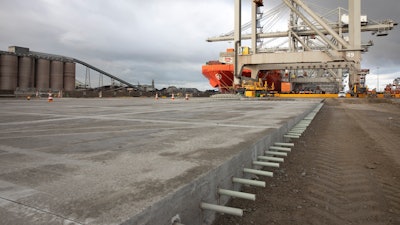Cutting-edge Composites in Modern Building Projects
Cutting-edge Composites in Modern Building Projects
Blog Article
The Function of Recycled Composites: Enhancing Efficiency and Sustainability Efforts
In today's ever-evolving landscape of materials design and sustainability initiatives, the application of recycled compounds has actually arised as an engaging location of interest. By utilizing the power of recycled compounds, companies can not just raise their operational performance and product quality yet additionally contribute to a more sustainable future.
Advantages of Recycled Composites
Recycled composites offer a sustainable solution that not just boosts efficiency but also minimizes environmental impact in various industries. One of the essential benefits of utilizing recycled compounds is their capacity to divert waste from land fills. By integrating materials such as recycled plastics or carbon fiber into making processes, business can decrease the amount of waste produced and promote a round economic situation.
In addition, recycled composites often display comparable or perhaps exceptional mechanical residential properties to virgin products. This indicates that products made from recycled compounds can maintain high efficiency criteria while being much more eco-friendly. Additionally, using recycled composites can help companies satisfy their sustainability goals and minimize their carbon impact.

Efficiency Benefits of Recycled Composites
Enhancing structural integrity and toughness, recycled compounds provide notable performance benefits in numerous industrial applications. One significant benefit is the boosted strength-to-weight ratio that reused compounds offer. This property is specifically crucial in industries such as aerospace, vehicle, and building, where lightweight products that maintain high strength are very looked for after.

Additionally, recycled composites use premium exhaustion resistance contrasted to lots of standard products - composites. This particular is crucial in sectors based on cyclic loading or vibrant stresses, as it assists prevent premature failing and guarantees long-term dependability
In addition, recycled compounds can be tailored to satisfy details efficiency needs by changing the kind and percentage of recycled materials made use of in their manufacturing process. This modification capacity permits the advancement of high-performance composites that deal with the special requirements of various markets, additionally highlighting the performance advantages of recycled compounds.
Environmental Effect of Recycled Composites
The fostering of recycled composites in different markets has actually prompted a more detailed assessment of their ecological effect. When analyzing the ecological implications of recycled composites, it is critical to consider both their manufacturing procedure and end-of-life disposal. In comparison to conventional composites, recycled compounds supply the advantage of drawing away waste from landfills and minimizing the demand for raw products extraction (composites). This facet adds to decrease energy intake and this page greenhouse gas emissions during the manufacturing phase, aligning with sustainability objectives.
Additionally, making use of recycled composites can bring about a decline in total carbon footprint and ecological contamination. By including recycled materials into a fantastic read new composite products, business can add to source conservation and waste reduction initiatives. In addition, the resilience and long life of recycled compounds can extend product life-span, more reducing ecological effect. In spite of these advantages, challenges such as maintaining worldly high quality and ensuring appropriate recycling framework exist. Proceeded study and development in this field are vital to optimize the ecological performance of recycled composites and development sustainable techniques throughout markets.
Applications of Recycled Composites
Numerous sectors have embraced the utilization of recycled composites because of their flexibility and performance-enhancing homes. Among the key applications of recycled composites remains in the auto market, where they are used to manufacture light-weight elements such as bumpers, interior panels, and under-the-hood parts. These compounds help in reducing the total weight of cars, improving gas performance and minimizing carbon discharges.
In the construction sector, recycled composites are progressively being made use of to produce weather-resistant and resilient building materials. These products use high strength-to-weight ratios, making them suitable for applications such as roofing, cladding, and decking. In addition, the use of recycled compounds in framework jobs, such as bridges and passages, has actually obtained grip due to their long life and resistance to deterioration.
Moreover, the aerospace sector counts on recycled composites to produce airplane components that need high stamina and tightness. These composites play an important role in boosting the efficiency and gas efficiency of airplane while minimizing maintenance costs. Overall, the varied applications of recycled compounds throughout markets highlight their substantial contribution to improving sustainability efforts and boosting efficiency standards.
Future Outlook for Recycled Composites
With an increasing emphasis on sustainability and technology, the future outlook for recycled composites in numerous industries appears appealing. As firms make every effort to fulfill ecological objectives and reduce their carbon impact, the need for sustainable materials like recycled compounds is expected to rise dramatically. Industries such as automotive, building and construction, consumer, and aerospace items are significantly transforming to recycled composites because of their lightweight, sturdy, and eco-friendly properties.
In the auto market, making use of recycled composites in vehicle manufacturing is predicted to enhance as car manufacturers seek to generate lighter and a lot more fuel-efficient vehicles. In a similar way, in the building and construction industry, there is an expanding interest in making use of recycled compounds for facilities tasks to lower waste and improve official site sustainability. The aerospace sector is also checking out the possibility of recycled compounds for aircraft parts to enhance fuel effectiveness and reduce emissions.
Verdict
The applications of recycled composites are large, ranging from building and construction to automotive markets. Moving forward, the usage of recycled compounds is expected to proceed to expand as business and sectors prioritize sustainability initiatives in their operations.
In today's ever-evolving landscape of products engineering and sustainability initiatives, the application of recycled compounds has actually emerged as an engaging location of rate of interest. In comparison to standard compounds, recycled composites provide the benefit of drawing away waste from landfills and lowering the demand for raw products removal. By integrating recycled products right into brand-new composite items, firms can add to resource preservation and waste decrease initiatives.In the building and construction sector, recycled compounds are significantly being utilized to develop resilient and weather-resistant structure products. As companies strive to meet environmental objectives and minimize their carbon footprint, the need for lasting products like recycled composites is anticipated to climb dramatically.
Report this page